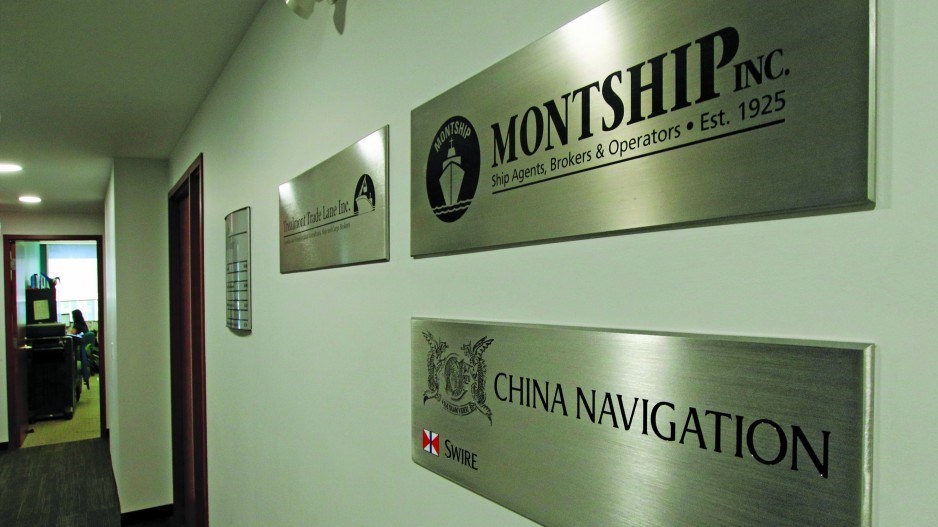Another major international marine transportation industry player is betting on Vancouver’s global shipping hub potential.
Singapore’s China Navigation Co. (CNCo) is scheduled to officially open its North American headquarters in Vancouver on August 9. The privately held merchant shipping company, founded in 1872 to operate paddle-steamers on the Yangtze River, is owned by U.K.-based John Swire and Sons Ltd. and is part of the Swire group of companies, a multinational conglomerate involved in aviation, marine services, property, beverage distribution and trading.
Swire, with 136,000 staff worldwide and a market cap estimated at US$69.4 billion, posted 2017 revenue of US$29.3 billion. It was established in 1816 and is headquartered in London, England.
Swire companies include Cathay Pacific Airways (HKG:0293), Swire Properties (HKG:1972) and Swire Pacific Ltd. (HK:0087).
Through its three core operating divisions – Swire Shipping, Swire Bulk and Swire Bulk logistics – CNCo operates a global shipping network of bulk, break-bulk and containerized cargo.
Kaity Arsoniadis-Stein, executive director for the Vancouver International Maritime Centre (VIMC), said CNCo’s decision to locate its North American head office in Vancouver adds weight to the city’s global maritime hub ambitions, especially in the robust transpacific trading corridor.
“The addition of this giant international shipping company will be noticed by others in this international industry sector and create further awareness and credibility that Vancouver is a viable maritime hub.”
Arsoniadis-Stein added that the west coast of North and South America currently has no maritime business hub, so establishing one in Vancouver could be a major win for local, regional and national economies.
“This is a big deal for our port because it goes beyond the throughput activities that ships bring to Canada and brings corporate business activities with global trade, capitalizing on an industry well beyond Canada’s borders.”
International maritime centres contribute billions to their countries’ GDPs. Oslo and Rotterdam, for example, annually add an estimated US$28.7 billion and US$26.3 billion, respectively, to the GDP in Norway and the Netherlands.
The new Vancouver location will be CNCo’s first official North American office outside of Singapore.
Bernard Huizenga, Swire Bulk’s general manager for commercial and business development, said CNCo also has offices in San Francisco and Miami, but the Vancouver office will be where all CNCo’s transpacific bulk, break-bulk and container shipping decisions will be made for the North American market.
He pointed to two main reasons behind the decision to open the new CNCo office in Vancouver: most of the company’s grain, forestry and natural-resource bulk shipping customers are in the area and Vancouver offers tax incentives for maritime shipping companies.
Those incentives include exemptions on shipping operations, office and management activities and capital gains on the sale of vessels outside of Canada.
“Vancouver is a very locally oriented market; you really need to know people; there is a lot of face-to-face contact. It is a little bit of a conservative market, and most of your customers are located here, and that was [why] the decision was made.”
Bernard added that the VIMC played an important role in helping CNCo navigate Canadian immigration, business and
financial-sector complications.
CNCo met with Arsoniadis-Stein and VIMC chairman Graham Clarke during the 2016 Singapore Maritime Week Global Conference.
The mandate of the federally and provincially funded VIMC is to deepen Vancouver’s maritime industry talent pool by attracting more affiliate and branch offices and eventually more head offices of leading maritime industry companies to Metro Vancouver.
To that end, VIMC later connected CNCo with PwC and prominent maritime law firm Norton Rose Fulbright to help it untangle the complexities of setting up a company in Canada.
Vancouver’s aim to become a major international shipping industry hub got a significant shot in the arm last year when Menon Economics’ 2017 Leading Maritime Capitals of the World report noted that, apart from No. 1-ranked Singapore, “no city has a more attractive policy framework than Vancouver” for aspiring international maritime centres.
The Oslo-based research institution’s overview of top maritime centres, which is published every two years, predicted future gains for Vancouver in the report’s rankings.
The Menon report followed the release in February of Deloitte’s EU Shipping Competitiveness Study, which rated Vancouver as one of five leading international shipping centres used in its comparative benchmarking analysis. Vancouver scored well in the report’s regulatory, economic and political factors category.
But both Menon and Deloitte reports noted that Metro Vancouver, which is in an inconvenient time zone for trading with key markets in Europe and Asia, still lags far behind other shipping centres in the local availability of the legal, finance, logistics, insurance, brokering, chartering and professional support services that are critical to success in the complex business of international shipping and cargo handling.
The city also presents assorted complications for corporate executives and other workers in obtaining visas.
But Arsoniadis-Stein said that over the past three years, the VIMC has connected with more than 800 companies and helped convince 14 to open offices in B.C.
Prominent global shipping industry companies that have major offices in Metro Vancouver now include Seaspan Corp. (NYSE:SSW), Teekay Corp. (NYSE:TK), Pacific Basin Shipping Ltd. (HKG:2343), Mediterranean Shipping Co., Norton Rose Fulbright and Methanex Corp.’s (TSX:MX) Waterfront Shipping Co. Ltd.
The city is also home to shipping industry management and investment company Greystoke Marine Management and international naval architects and designers like Robert Allan Ltd. and VARD Marine.
Arsoniadis-Stein emphasized that the value of becoming a viable maritime shipping hub goes far beyond ship traffic and trade corridors.
Without that hub, she said, Canada is missing out on an estimated US$20 billion annually in high-value upstream corporate business activities connected with the global shipping business.
She cited a shipowner’s view on the Canadian approach thus far: “Canada operates like a ‘banana republic,’ spending billions on infrastructure development, ports, rail, roads, etc., while leaving other maritime clusters, such as Singapore, Oslo, London, Shanghai to reap real the financial benefits.” •
@timothyrenshaw




